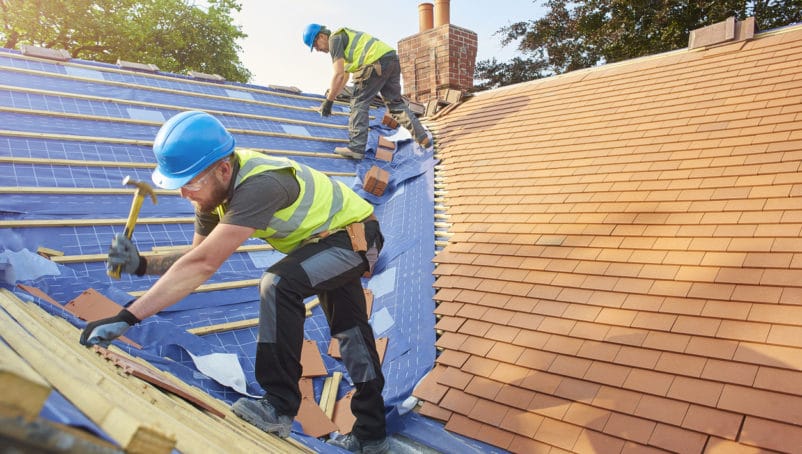Alabama
To become a Roofing and Sheet Metal Contractor in Alabama, you’ll need a state license. The license is issued by the Licensing Board for General Contractors and is required for commercial projects worth $50,000 or more and residential jobs worth $10,000 or more.
You’ll need to pass a trade exam, as well as a business and law exam. You must show proof of completion of three projects within the past three years.
Alaska
Roofing falls under the category of Specialty Contractor in Alaska and requires a state license from the Department of Commerce, Community and Economic Development, Division of Corporations, Business and Professional Licensing.
For a non-residential license, you’ll need to show proof of liability insurance and workers’ compensation insurance and place a $5,000 bond. For a residential license, you’ll need to complete the Alaska Craftsman Home Program within two years before applying for the license and you’ll need to pass an exam.
Arizona
To do roofing work in Arizona, you’ll need a state license issued by the State of Arizona Registrar of Contractors (ROC). Roofing is a specialty classification with specific licenses for residential or commercial work.
You’ll need to pass a trade exam and provide your financial statement, as well as proof of workers’ compensation and a surety bond.
Arkansas
Any type of construction work, including roofing, to the value of $2,000 or more, requires a state license in Arkansas. There are commercial and residential Home Improvement contractor licenses, both of which are issued by the Contractors Licensing Board.
If you’re applying for an unlimited license, you must show a financial statement and proof of workers’ compensation insurance.
California
Roofing contractors must be licensed to work on projects worth more than $500 in California. Roofing contractors fall under the Class C Specialty Contractors License Classifications issued by the Department of Consumer Affairs Contractors State License Board.
To get a roofing license in California, you must pass an exam but before you apply, you’ll need to show at least four years of experience in the past ten years, at a journeyman level, foreman, supervisor or contractor in the classification for which you’re applying for a license.
You’ll also need a $15,000 surety bond for a roofing license in California.
Colorado
Roofing contractors fall under the category of general contractors in Colorado and are not required to hold a state license. You will be required to have a business license. It is important to check the local requirements as there may be regulations and requirements at the local level.
Connecticut
Roofing contractors are not required to have a state license in Connecticut; however, if you do business under the banner of home improvement contractor, you’ll need to be registered with the Department of Consumer Protection.
There is an annual fee for registration.
Delaware
Any roofing contractor working on jobs worth more than $50,000 must register with, and get a business license from, the Delaware Division of Revenue. A Class B Asbestos Abatement Certification for roofing or siding contractors is issued by the Division of Facilities Management and you’ll need to complete an approved training course to receive this type of license.
Florida
Florida has two options for a roofing contractor license. You can become a certified contractor to work on projects throughout the state or you can become a registered contractor if you only plan to work on projects in a specific city or county.
The certified contractor license has several requirements, including educational and work experience, a background check and roofing insurance.
Registered contractor license requirements include a certificate of competency, proof of financial responsibility and business insurance in Florida.
Learn more about roofing license requirements in Florida.
Georgia
There are no state roofing license requirements for roofing contractors in Georgia as they are considered an Exempt Specialty Contractor by the State Licensing Board. However, you may choose to get licensed voluntarily with the Georgia Roofing Contractors Association (GARCA).
Hawaii
To work as a roofer in Hawaii, you’ll need a C-42 Roofing Contractor License issued by the Department of Commerce and Consumer Affairs Professional and Vocational Licensing. You’ll need to pass a trade exam, as well as a business and law exam.
To be eligible to take the exam, you’ll need to show four years of supervisory work experience in the past 10 years as a journeyman, foreman, supervisor or contractor. Up to one year of experience can be substituted with relevant experience.
Idaho
Idaho’s roofing license requirements do not require roofers to hold a state license; however, you are required to be registered with the Idaho Contractors Board. There is no experience, education or examination requirement; however, you will need to show your business information and proof of insurance.
Illinois
Roofing contractors in Illinois require a state Illinois roofing license issued by the Department of Professional Regulation. There are three types of licenses and you must apply for the license of the type of work you plan to do — Residential (limited license), Residential, Commercial and Industrial (unlimited license) or Commercial/Industrial (you must pass the Residential license exam before you can apply for this one).
To qualify to apply, you must pass the state exam, and if you have employees, you must show proof of business insurance in Illinois and post a $10,000 surety bond.
Indiana
Indiana does not require roofing contractors to hold a state license; however, there may be local requirements so make sure to check these before you begin work.
Iowa
All construction contractors who earn more than $2,000 per year are required to be registered with the Iowa Division of Labor if they work in the state. There is no exam, but you must show proof of unemployment insurance.
Roofing contractors do not require a state license, unless you’re working with asbestos.
Kansas
While there is no state license for roofing contractors in Kansas, you must hold a roofing contractor registration certificate issued by the Kansas Attorney General in order to do work on either residential or commercial projects in the state.
You must show proof of liability business insurance in Kansas and workers’ compensation insurance according to the state roofing license requirements.
Kentucky
There are no state roofing license requirements for roofing contractors in Kentucky; however, you may choose to be certified with the Kentucky Roofing Contractors Association (KRCA).
Louisiana
Roofing contractors in Louisiana require a state license for any building construction work worth more than $75,000 or home improvement or repair work worth more than $7,500. The Louisiana State Licensing Board for Contractors issues commercial and residential licenses and home improvement registration.
You’ll need to pass a trade exam, as well as a business and law exam. You’ll need to show proof of general liability and workers’ compensation insurance.
Maine
Roofing contractors do not require a state license to work in Maine, unless they work with asbestos. In that case, you will require a Conditional Asbestos Abatement License from the Department of Environmental Protection.
Maryland
General contractors, including roofing contractors, do not require a state license to work in Maryland. However, certain roofing work may fall under the category of Home Improvement, which does require a state license and is issued by the Maryland Home Improvement Commission (MHIC).
To apply for the license you’ll need to show two years of work experience and pass the exam. You’ll also need to show proof of insurance to comply with state roofing license requirements.
Massachusetts
Roofing contractors in Massachusetts must be licensed by the State Board of Building Regulations and Standards. This is the Construction Supervisor License; however, if you work on existing structures, you will also need a state registration.
There is no exam for the Home Improvement Registration, but there is for the Construction Supervisor’s License. You’ll need to pass the exam and show three years of work experience to be eligible for the license and will need to apply for either a Restricted License (one and two-family dwellings) or an Unrestricted License (structures up to 35,000 cubic feet).
There are also roofing license requirements from the Department of Labor and Workforce Development for work with asbestos.
Michigan
Roofing contractors in Michigan require a state license from the Department of Licensing and Regulatory Affairs. The roofing license falls under the category of Residential Maintenance and Alteration (M&A).
Before you apply, you need to complete 60 hours of education and then pass an exam.
Minnesota
To work as a roofing contractor in Minnesota, you’re required to hold a state license if the total value of your annual work comes to more than $15,000. The license is issued by the Department of Labor and Industry.
To get a license, you need to pass the residential roofer trade exam, you must show proof of insurance and you must post a $15,000 surety bond.
Mississippi
Roofing contractors who perform residential roofing services worth over $10,000 require a Residential Roofing License from the Mississippi State Board of Contractors. You’ll need to pass a trade exam, as well as a business and law exam.
You’ll also need to show your financials and show proof of insurance before you’re approved for a license.
Missouri
Missouri does not require a state license for roofing contractors; however, there may be roofing license requirements at a local level.
Montana
Roofing contractors are not required to hold a state license in Montana; however, they and all other construction contractors and subcontractors with employees must register with the Department of Labor and Industry.
If you have no employees, you can register, but are not required to.
Nebraska
Roofing contractors, along with all other general contractors and sub-contractors in Nebraska who perform construction or repair work, are required to register with the Nebraska Department of Labor. There are no state roofing licensing requirements.
Nevada
Roofing contractors in Nevada require a C-15a Roofing Contractor License issued by the State Contractors Board. To be pre-approved to take the exam, you will be required to show at least four years of experience in the past ten years as a journeyman, foreman, contractor or supervising employee.
Education may be used to substitute for some years of experience. You’ll need to show your finances, obtain a bond and show proof of workers’ compensation insurance. You’ll then be approved to take the trade and business and law exams.
New Hampshire
Roofing contractors do not require a state license to work in New Hampshire, unless they work with asbestos.
New Jersey
You do not require a state license to work as a roofing contractor in New Jersey; however, you are required to be registered. Since March 2018, you no longer require a construction permit for roofing jobs on one- and two-family homes.
New Mexico
Roofing contractors in New Mexico fall under the classification of Construction Contractors and require a state license to work. You’ll require two years of experience to be approved to take the exam and you must pass the trade exam, as well as the business and law exam.
The license is issued by the Construction Industries Division, State of New Mexico Regulation and Licensing Department.
New York
You will not need a state license to work as a roofing contractor in New York; however, there are local licensing requirements. Make sure to check the local regulations before you begin work.
North Carolina
To work as a roofing contractor in North Carolina, you’ll require a state license for any jobs worth $30,000 or more. The license is issued by the North Carolina Licensing Board for General Contractors and you’ll need pre-approval before you can take the exam.
You must show minimum working capital which depends on the size of the jobs you want to bid on.
North Dakota
Roofing contractors require a state license in North Dakota for any jobs worth $4,000 or more. There are four classes of licenses issued by the Secretary of State of North Dakota, depending on the size of the jobs you plan to take on.
There is no exam requirement, but you will need to show that you don’t owe any taxes and show proof of workers’ compensation insurance and liability insurance.
Ohio
You won’t need a state license to work as a roofing contractor in Ohio; however, there may be roofing license regulations at the local level which you’ll need to check before you can begin work.
Oklahoma
Roofing contractors do not need a state license to work in Oklahoma, but do need a Roofing Contractor Registration. To be registered and get the equivalent of an Oklahoma roofing license, you’ll need to show proof of workers’ compensation and liability insurance.
Oregon
Roofing contractors in Oregon need a state license to work in Oregon. You’ll need to complete pre-license training and pass a test before you’ll be issued with a license from the Construction Contractors Board.
You’ll also need to show proof of general liability insurance and workers’ compensation insurance.
Pennsylvania
There are no state license requirements for roofing contractors in Pennsylvania; however, you may need to comply with local licensing requirements before you begin work.
Rhode Island
Commercial roofing contractors in Rhode Island require a state license to work. The license is issued by the State of Rhode Island Contractors’ Registration and Licensing Board. To be licensed, you’ll need to pass an exam and complete 10 hours of continuing roofing education per year.
You’ll also need to show proof of insurance and be bonded. All other contractors must be registered with the board.
South Carolina
Roofing contractors, who fall under the category of Residential Specialty Contractor, do not require a state license to work in South Carolina, but they must be registered with the South Carolina Department of Labor, Licensing and Regulation.
To become registered, you must submit references and a surety bond if your work will be worth more than $5,000.
South Dakota
Roofing contractors do not need a state license to work in South Dakota. There may be licensing requirements at the local level so make sure to check these before you begin work.
Tennessee
As of January 2014, roofing contractors require a state license to perform any work in Tennessee on projects worth more than $25,000. The license is awarded by the State of Tennessee Department of Commerce and Insurance Board for Licensing Contractors.
You must pass a trade exam, as well as a business and law exam. You must also provide a financial statement and show proof of general liability and workers’ compensation insurance.
Texas
Roofing contractors are not required to hold a state license in Texas; however, there is a voluntary licensing process through the Roofing Contractors Association if you are interested.
Utah
All contractors, including roofing contractors, require a state license issued by the Utah Department of Commerce Division of Occupational and Professional Licensing to perform work in the state. You’ll need to pass a trade exam, as well as a business and law exam.
To be eligible to take the exam, you must have four years of work experience, and must show proof of general liability and workers’ compensation insurance.
Vermont
Roofing contractors do not require a state license to work in Vermont; however, there may be local regulations so make sure to check these before you begin working.
Virginia
To work as a roofing contractor in Virginia you will need a state license. There are three types of licenses – Class A, B and C – depending on the value of the work you do and these are all issued by the Department of Professional and Occupational Regulation Board of Contractors.
As the qualified individual for your specialty trade license, you must show two years of experience for a Class C certificate, three years of experience for a Class B license and five years of experience for a Class A license. You must pass an exam to be eligible for the license.
Washington
Roofing contractors do not require a state license to work in Washington; however, you must register with the Department of Labor and Industries Contractors’ Registration Section.
West Virginia
Construction contractors, including roofing contractors, must be licensed to work in West Virginia. The license is issued by the Division of Labor West Virginia Contractor Licensing Board. You’ll need to pass a trade exam, as well as a business and law exam.
You must also show proof of workers’ compensation insurance.
Wisconsin
As a roofing contractor, you don’t need to be licensed at the state level to work in Wisconsin; however, if you work in asbestos abatement, you will need to be certified by the Asbestos Unit Bureau of Public Health.
Wyoming
Roofing contractors do not require a state license to work in Wyoming; however, there may be local licensing requirements which you’ll need to check before you begin work.





